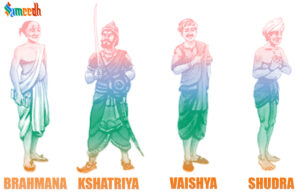Shudras are associated with service-oriented roles and manual labor. Their duty is to assist the other three varnas in their respective tasks.

In the traditional Hindu caste system, Shudras are a social and religious category associated with laborers and service providers. They are considered the fourth varna (social class) in the hierarchical structure. Shudras traditionally performed various tasks related to manual labor and service to support the functioning of society.
Key characteristics and roles of Shudras in Hindu society include:
- Service and Labor: Shudras were traditionally engaged in various forms of manual labor, including agricultural work, craftsmanship, and service occupations. They played a crucial role in supporting the economic activities of the community.
- Supporting the Three Other Varnas: The primary role of Shudras was to provide service and support to the three other varnas—Brahmins (priests and scholars), Kshatriyas (warriors and rulers), and Vaishyas (merchants and farmers). This support was considered essential for the smooth functioning of society.
- Observing Dharma: Shudras were expected to follow their duties and responsibilities as outlined by dharma (righteousness) and contribute to the overall well-being of society.
It’s important to note that the traditional caste system has been a source of social stratification and discrimination, and the roles assigned to different varnas were often hereditary. Over time, there have been significant social and legal changes to address caste-based discrimination in India.
In contemporary Hindu society, many reject the rigid caste distinctions, and the emphasis is placed on principles of equality and social justice. The Indian Constitution prohibits discrimination based on caste, and affirmative action measures, such as reservations in education and employment, have been implemented to uplift historically marginalized communities, including those traditionally classified as Shudras. The recognition and promotion of individual merit and opportunities for all are important aspects of the evolving social landscape in modern India.